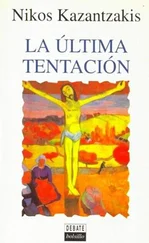Nikos Kazantzakis - Zorba The Greek
Здесь есть возможность читать онлайн «Nikos Kazantzakis - Zorba The Greek» весь текст электронной книги совершенно бесплатно (целиком полную версию без сокращений). В некоторых случаях можно слушать аудио, скачать через торрент в формате fb2 и присутствует краткое содержание. Жанр: Современная проза, на английском языке. Описание произведения, (предисловие) а так же отзывы посетителей доступны на портале библиотеки ЛибКат.
- Название:Zorba The Greek
- Автор:
- Жанр:
- Год:неизвестен
- ISBN:нет данных
- Рейтинг книги:3 / 5. Голосов: 1
-
Избранное:Добавить в избранное
- Отзывы:
-
Ваша оценка:
- 60
- 1
- 2
- 3
- 4
- 5
Zorba The Greek: краткое содержание, описание и аннотация
Предлагаем к чтению аннотацию, описание, краткое содержание или предисловие (зависит от того, что написал сам автор книги «Zorba The Greek»). Если вы не нашли необходимую информацию о книге — напишите в комментариях, мы постараемся отыскать её.
Zorba The Greek — читать онлайн бесплатно полную книгу (весь текст) целиком
Ниже представлен текст книги, разбитый по страницам. Система сохранения места последней прочитанной страницы, позволяет с удобством читать онлайн бесплатно книгу «Zorba The Greek», без необходимости каждый раз заново искать на чём Вы остановились. Поставьте закладку, и сможете в любой момент перейти на страницу, на которой закончили чтение.
Интервал:
Закладка:
Black and fair beards, red and grey beards, four sorts of perfume-violet, eau-de-Cologne, musk, patchouli; the doors of the metal cabin were closed, the heavy curtains drawn to, the lights were lit. Madame Hortense closed her eyes. All her life of love, all her life of torment-ah, almighty God! it had lasted no more than a second…
She goes from knee to knee, clasps in her arms gold-braided uniforms, buries her fingers in thick-scented beards. She cannot remember their names, any more than her parrot can. She can only remember Canavaro, because he was the youngest of them all and his name was the only one the parrot could pronounce. The others were complicated and difficult to pronounce, and so were forgotten.
Madame Hortense sighed deeply and hugged the crucifix passionately to her.
"My Canavaro, my little Canavaro…" she murmured in her delirium, pressing it to her flabby breasts.
"She's beginning not to know what she's saying," murmured aunt Lenio. "She must have seen her guardian angel and had a scare… We'll loosen our kerchiefs and go nearer."
"What! Haven't you any fear of God, then?" said mother Malamatenia. "D'you want us to begin singing while she's still alive?"
"Ha, mother Malamatenia," grumbled aunt Lenio under her breath, "instead of thinking about her trunk and her clothes and all the things she has outside in the shop, and the hens and rabbits in the yard, there are you telling me we ought to wait till she's breathed her last! No! First come first served, I say!"
And as she spoke she stood up, and the other followed her angrily. They undid their black kerchiefs, let down their thin white hair and gripped the edges of the bed.
Aunt Lenio gave the signal by letting out a long piercing cry enough to make a cold shiver go down your spine.
"Eeeee!"
Zorba leaped up, seized the two old women by the hair and dragged them back.
"Shut your traps, you old magpies!" he shouted. "Can't you see she's still alive! Go to hell!"
"Doddering old idiot!" grumbled mother Malamatenia, fastening her kerchief again. "Where's he sprung from, I'd like to know, the interfering fool!"
Dame Hortense, the sorely tried old siren, heard the strident cry beside her bed. Her sweet vision faded; the admiral's vessel sank, the roast pheasants, champagne and perfumed beards disappeared and she fell back on to that stinking deathbed, at the end of the world. She made an effort to raise herself, as though trying to escape, but she fell back again and cried softly and plaintively.
"I don't want to die! I don't want to…"
Zorba leaned forward and touched her forehead with his great horny hand, and brushed away the hair which was sticking to her face; his bird-like eyes filled with tears.
"Quiet, my dear, quiet," he murmured. "I'm here; this is Zorba. Don't be afraid."
And suddenly the vision returned, like an enormous sea-green butterfly and spread íts wings over the whole bed. The dying woman seized Zorba's big hand, slowly stretched out her arm and put it round hís neck as he bent over her. Her lips moved…
"My Canavaro, my little Canavaro…"
The crucifix slipped off the pillow, fell to the floor and broke into little pieces. A man's voice rang out in the yard:
"Come on! Pop the hen in now, the water's boiling!"
I was sittíng in a corner of the room and from time to time my eyes filled with tears. That is life, I thought-checkered, incoherent, indifferent, perverse… pitiless. These primitive Cretan peasants surround this old cabaret singer come from the other end of the earth and with inhuman joy watch her die, as if she were not also a human being. As though a huge exotic bird had fallen from the sky, its wings broken, and they had gathered on the seashore by their village to watch it die. An old pea fowl, an old angora cat, a sick old seal…
Zorba gently removed Dame Hortense's arm from round his neck and stood up, white-faced. He wiped his eyes with the back of his hand, looked at the sick woman but could see nothing. He wiped his eyes again and could just see her moving her swollen helpless feet in the bed and twisting her mouth in terror. She shook herself once, twíce, the bedclothes slipped to the floor and she appeared, half-naked, covered with sweat, swollen, a greenish-yellow color. She uttered a strident, piercing cry like a fowl when its throat is cut, then she remained motionless, her eyes wide open, terrified, glassy.
The parrot jumped down to the bottom of its cage, clutched the bars and watched as Zorba reached out his huge hand and, with indescribable tenderness, closed his mistress's eyelids.
"Quick, all of you! She's gone!" yelped the dirge singers, rushing to the bed. They uttered a prolonged cry, rocking backwards and forwards, clenching their fists and beating their breasts. Little by líttle the monotony of this lugubrious oseillation produced in them a slight state of hypnosis, old griefs of their own invaded their minds like poison, their hearts were opened and the mirologue burst forth.
"It was not meet for thee, to lie beneath the earth…"
Zorba went out into the yard. He wanted to weep, but he was ashamed to do so in front of the women. I remember he said to me once: "I'm not ashamed to cry, if it's in front of men. Between men there's some unity, isn't there? It's no disgrace. But in front of women a man always has to prove that he's courageous. Because if we started crying our eyes out, too, what'd happen to these poor creatures? It would be the end!"
They washed her with wine; the old woman who was laying her out opened the trunk, took out clean clothes and changed her, pouring over her a bottle of eau-de-Cologne. From the nearby gardens came the blow flies and laid their eggs in her nostrils, round her eyes and in the corners of her lips.
Night was falling. The sky to the west was beautifully serene. Small, fleecy red clouds edged with gold were sailing slowly across the dark-purple evening sky, looking one moment like ships, the next like swans, then like fantastic monsters made of cotton wool and frayed silk. Between the reeds in the yard could be seen the gleaming waves of the choppy sea.
Two well-fed crows flew from a fig tree close by and walked up and down the yard. Zorba angrily picked up a pebble and made them fly away.
In the other corner of the yard the village marauders had prepared a tremendous feast. They had brought out the large kitchen table, searched out bread, plates, knives and forks. They had brought from the cellar a demijohn of wine, and cooked a few hens in the pot. Now, hungry and happy, they were eating and drinking with a fine relish and clinking glasses.
"God save her soul! And for all she's done let her off the forfeits!"
"May all her lovers turn into angels and carry her soul to heaven!"
"Just take a look at old Zorba," said Manolakas. "He's throwing stones at the crows! He's a widower now; let's ask him to drink to the memory of his woman! Hullo, Zorba! Come and join us, countryman."
Zorba turned round. He saw the full table, the steaming hens in the dishes, the wine glistening in the glasses, the stout sun-tanned fellows sitting jauntily with their scarves tied round their heads, all instinct with youth.
"Zorba, Zorba!" he murmured. "Hold on! This is where you'll have to show what you're made of!"
He went over to them, drank a glass at one gulp, then a second, then a third, and ate a leg of chicken. They spoke to him, but he made no reply. He ate and drank fast, greedily, in huge mouthfuls, lengthy draughts, and in silence. He kept looking towards the room where Bouboulina was lying and listening to the mirologues coming through the open window. From time to time the funereal chants broke off and they could hear some shouts, as though a quarrel had started, and the sounds of cupboards and trunks being opened and shut, and heavy, rapid tramplings as if people were fighting. Then, the mirologue would begin again, monotonous, despairing, a soft murmur like that of a bee.
Читать дальшеИнтервал:
Закладка:
Похожие книги на «Zorba The Greek»
Представляем Вашему вниманию похожие книги на «Zorba The Greek» списком для выбора. Мы отобрали схожую по названию и смыслу литературу в надежде предоставить читателям больше вариантов отыскать новые, интересные, ещё непрочитанные произведения.
Обсуждение, отзывы о книге «Zorba The Greek» и просто собственные мнения читателей. Оставьте ваши комментарии, напишите, что Вы думаете о произведении, его смысле или главных героях. Укажите что конкретно понравилось, а что нет, и почему Вы так считаете.












